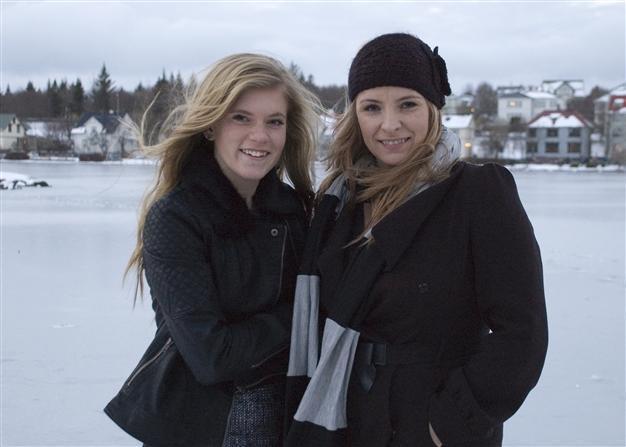Icelandic girl fights for right to her own name
REYKJAVIK - The Associated Press

In this Sunday, Dec. 30, 2012 photo, Blaer Bjarkardottir, 15, left, and her mother, Bjork Eidsdottir, are photographed in front of a pond in Reykjavik. AP Photo
Call her the girl with no name.
A 15-year-old is suing the Icelandic state for the right to legally use the name given to her by her mother. The problem? Blaer, which means "light breeze" in Icelandic, is not on a list approved by the government.
Like a handful of other countries, including Germany and Denmark, Iceland has official rules about what a baby can be named. In a country comfortable with a firm state role, most people don’t question the Personal Names Register, a list of 1,712 male names and 1,853 female names that fit Icelandic grammar and pronunciation rules and that officials maintain will protect children from embarrassment. Parents can take from the list or apply to a special committee that has the power to say yea or nay.
In Blaer’s case, her mother said she learned the name wasn’t on the register only after the priest who baptized the child later informed her he had mistakenly allowed it.
"I had no idea that the name wasn’t on the list, the famous list of names that you can choose from," said Bjork Eidsdottir, adding she knew a Blaer whose name was accepted in 1973. This time, the panel turned it down on the grounds that the word Blaer takes a masculine article, despite the fact that it was used for a female character in a novel by Iceland’s revered Nobel Prize-winning author Halldor Laxness.
Given names are even more significant in tiny Iceland that in many other countries: Everyone is listed in the phone book by their first names. Surnames are based on a parent’s given name. Even the president, Olafur Ragnar Grimsson, is addressed simply as Olafur.
Blaer is identified as "Stulka" - or "girl" - on all her official documents, which has led to years of frustration as she has had to explain the whole story at the bank, renewing her passport and dealing with the country’s bureaucracy.
Her mother is hoping that will change with her suit, the first time someone has challenged a names committee decision in court.
Though the law has become more relaxed in recent years - with the name Elvis permitted, inspired by the charismatic rock and roll icon whose name fits Icelandic guidelines - choices like Cara, Carolina, Cesil, and Christa have been rejected outright because the letter "c” is not part of Iceland’s 32-letter alphabet.
"The law is pretty straightforward so in many cases it’s clearly going to be a yes or a no," said Agusta Thorbergsdottir, the head of the committee, a panel of three people appointed by the government to a four-year term.
Other cases are more subjective.
"What one person finds beautiful, another person may find ugly," she acknowledged. She pointed to "Satania" as one unacceptable case because it was deemed too close to "Satan."
The board also has veto power over people who want to change their names later in life, rejecting, for instance, middle names like Zeppelin and X.
When the artist Birgir Orn Thoroddsen applied to have his name legally changed to Curver, which he had used in one form or another since age 15, he said he knew full well the committee would reject his application.
"I was inspired by Prince who changed his name to The Artist Formerly Known As Prince and Puff Daddy who changed his to P. Diddy and then Diddy with seemingly little thought or criticism," he said. "I applied to the committee, but of course I got the ’No’ that I expected."
On his thirtieth birthday, he bought a full-page advertisement that read, "From February 1, 2006, I hereby change my name to Curver Thoroddsen. I ask the nation, my friends and colleagues to respect my decision."
"I can understand a clause to protect children from being named something like ’Dog poo,’ but it is strange that an adult cannot change his name to what he truly wants," he said.
Thoroddsen is keeping his protest to the media. But Eidsdottir says she is prepared to take her case all the way to the country’s Supreme Court if a court doesn’t overturn the commission decision on Jan. 25.
"So many strange names have been allowed, which makes this even more frustrating because Blaer is a perfectly Icelandic name," Eidsdottir said. "It seems like a basic human right to be able to name your child what you want, especially if it doesn’t harm your child in any way."
"And my daughter loves her name," she added.
